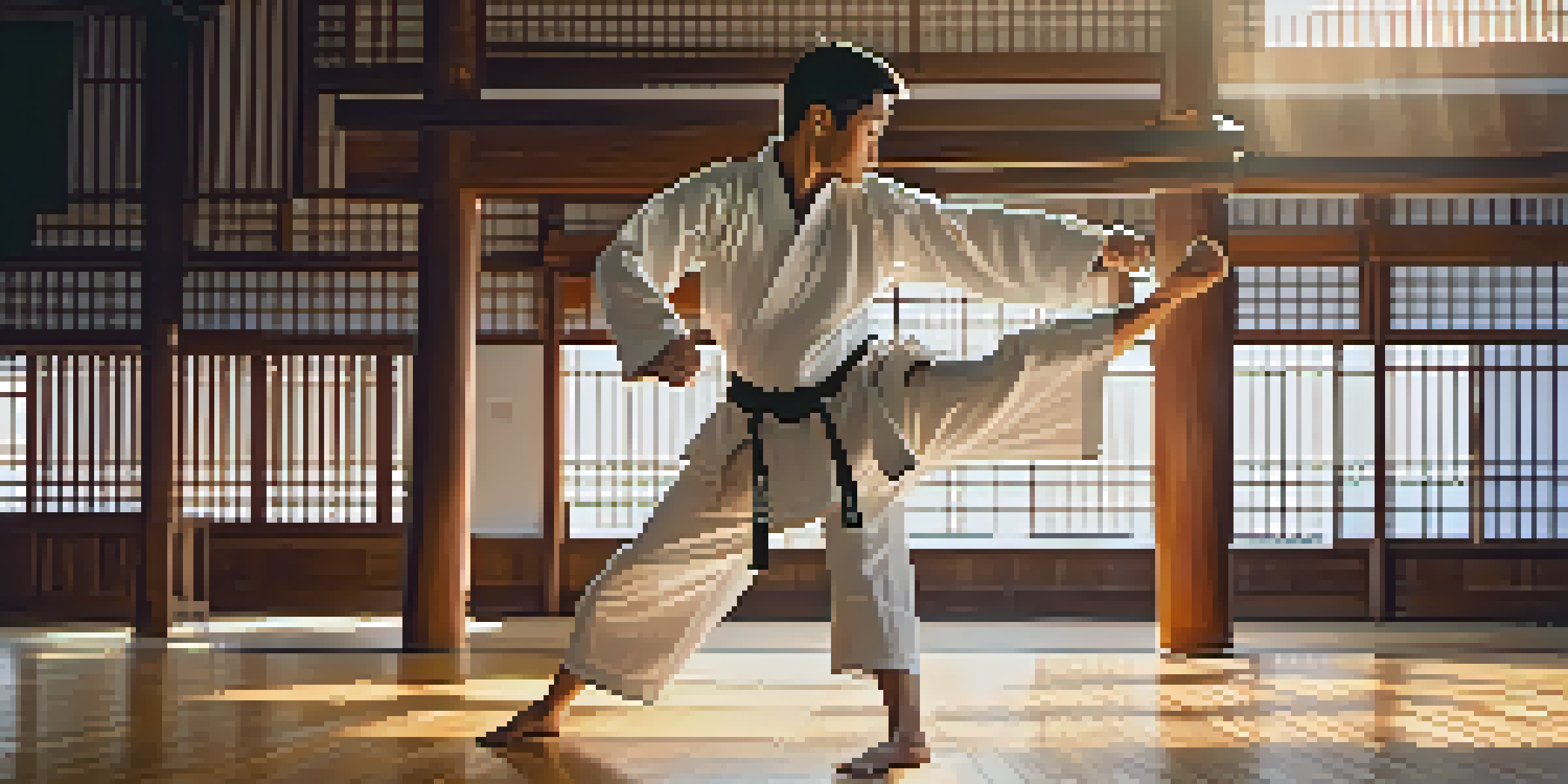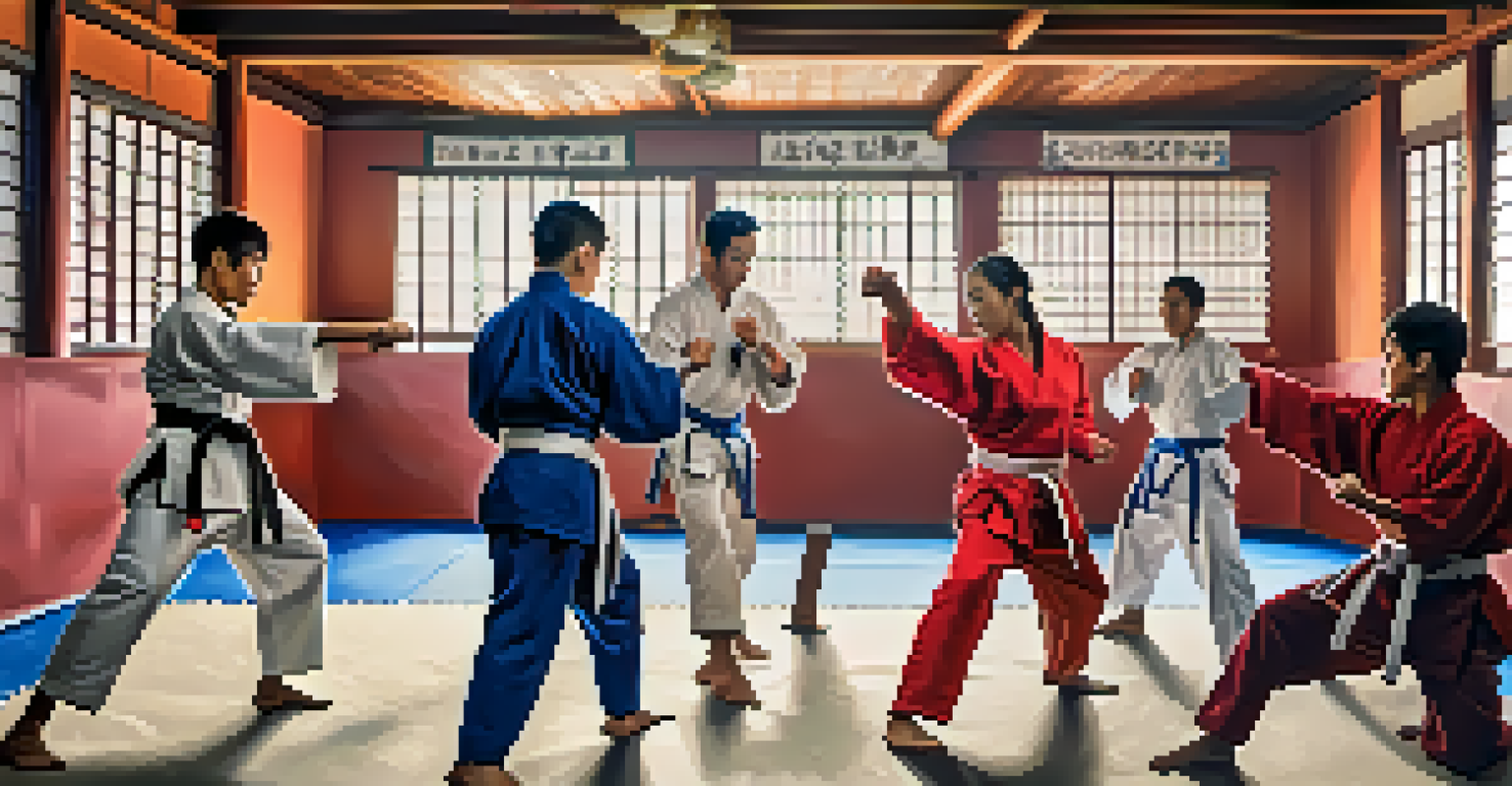Building Resilience: How Martial Arts Teaches Adaptability

Understanding Resilience and Its Importance
Resilience is the ability to bounce back from challenges and setbacks. It’s not just about enduring tough times but also about growing from them. In today’s fast-paced world, cultivating resilience is essential for both personal and professional success.
It’s not whether you get knocked down, it’s whether you get up.
Martial arts provide an excellent framework for building this vital skill. Practitioners learn to face physical and mental challenges, which can translate effectively into everyday life. Whether it’s dealing with stress at work or navigating personal relationships, resilience helps us manage it all.
By engaging in martial arts, individuals develop a mindset that embraces challenges rather than shies away from them. This shift in perspective is crucial; it empowers us to view obstacles as opportunities for growth, fostering a more adaptable approach to life.
The Role of Discipline in Martial Arts
One of the fundamental principles of martial arts is discipline. This discipline is not just about following rules; it’s about training the mind and body to respond effectively under pressure. Practicing consistently helps reinforce a sense of commitment and responsibility, which is vital for resilience.

Through rigorous training, martial artists learn to stay focused and calm, even in challenging situations. This discipline equips them with the tools needed to adapt to unexpected circumstances, making them more resilient in everyday life. It’s like training a muscle; the more you work it, the stronger it becomes.
Resilience Through Martial Arts
Practicing martial arts fosters resilience by teaching individuals to embrace challenges and learn from failures.
Moreover, this discipline often spills over into other areas of life. Whether it's meeting deadlines at work or managing personal commitments, the skills honed in martial arts can help individuals navigate challenges with greater ease and confidence.
Facing Fear and Building Confidence
Fear is a natural response to uncertainty, but martial arts teaches us how to confront and manage it. In the dojo, students often face their fears head-on, whether it's executing a difficult move or sparring with a partner. This experience can be transformative.
Our greatest glory is not in never falling, but in rising every time we fall.
As students learn to push through their fears, they gradually build self-confidence. Each small victory in training reinforces the belief that they can overcome obstacles, both on and off the mat. This newfound confidence is a vital component of resilience, enabling individuals to tackle life’s challenges with a positive mindset.
Additionally, facing fear in a controlled environment helps demystify it. By repeatedly confronting what scares them, practitioners learn that fear is not something to avoid but rather a signal to engage and grow. This lesson is invaluable, fostering a sense of adaptability in various aspects of life.
Learning from Failure in Martial Arts
In martial arts, failure is not viewed as a setback but as a stepping stone to success. Every fall, missed kick, or lost sparring match presents an opportunity to learn and improve. This perspective is crucial for developing resilience.
When practitioners fail, they are encouraged to analyze their performance and identify areas for growth. This process of reflection helps them understand that mistakes are part of the journey, not the end of it. Embracing failure in this way fosters a mindset that values learning over perfection.
Discipline Enhances Adaptability
The discipline developed in martial arts training translates into greater adaptability and focus in everyday life.
As students become more comfortable with failure, they develop a healthier relationship with risk. They learn that taking chances can lead to growth, making them more adaptable and open to new experiences. This resilience is essential, especially in a world that is constantly changing.
The Importance of Community in Martial Arts
Martial arts are often practiced in a community setting, which can significantly enhance resilience. Training with others fosters a sense of belonging and support, reminding practitioners that they are not alone in their journey. This communal aspect helps individuals feel empowered to share their struggles and triumphs.
Having a support system is crucial during challenging times, and martial arts communities provide just that. Whether it’s a fellow student offering encouragement or an instructor providing guidance, these interactions reinforce the idea that resilience is not solely an individual effort.
Additionally, the shared experiences within a martial arts community cultivate empathy and understanding. Participants learn to appreciate each other's strengths and challenges, which can strengthen their adaptability and enhance their ability to work through difficulties together.
Mindfulness and Focus in Martial Arts Training
Martial arts require a significant level of mindfulness and focus. Practitioners must remain present in the moment, paying attention to their movements and surroundings. This practice of mindfulness is invaluable for building resilience and adaptability.
By training the mind to focus, individuals can better manage stress and anxiety in their daily lives. The concentration developed in martial arts can help practitioners respond to challenges with clarity, rather than being overwhelmed by emotions. This ability to stay calm under pressure is a hallmark of resilience.
Community Builds Supportive Growth
Engaging in a martial arts community encourages shared experiences that enhance resilience and provide essential support.
Furthermore, mindfulness encourages a deeper understanding of oneself. As students become more aware of their strengths and weaknesses, they can adapt their strategies and approaches to various situations. This self-awareness is key to navigating life’s complexities with confidence.
Translating Martial Arts Lessons to Everyday Life
The lessons learned in martial arts extend far beyond the dojo. The adaptability and resilience developed through training can be applied to numerous real-life situations. From handling workplace stress to managing family dynamics, the skills gained are universally beneficial.
For instance, when faced with a challenging project at work, a martial artist can draw on their training to remain calm and focused. They might approach the task with the same discipline and determination they would use in their martial practice, leading to more effective problem-solving.

Ultimately, martial arts teach us that adaptability is a skill that can be nurtured and developed. By applying these lessons in various aspects of life, individuals can cultivate resilience that empowers them to face whatever challenges come their way.